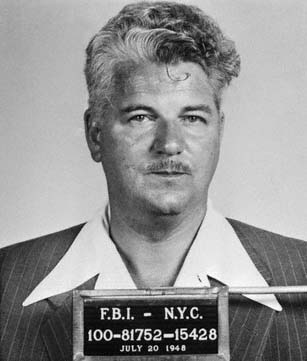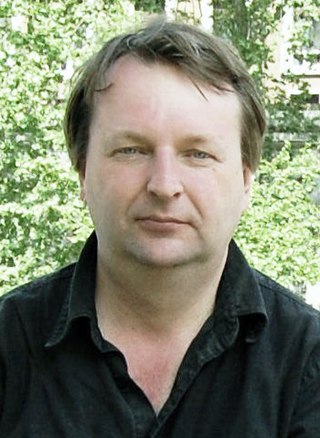Related Research Articles
The Venona project was a United States counterintelligence program initiated during World War II by the United States Army's Signal Intelligence Service, which ran from February 1, 1943, until October 1, 1980. It was intended to decrypt messages transmitted by the intelligence agencies of the Soviet Union. Initiated when the Soviet Union was an ally of the US, the program continued during the Cold War, when the Soviet Union was considered an enemy.

The Communist Party USA, officially the Communist Party of the United States of America (CPUSA), is a communist party in the United States which was established in 1919 after a split in the Socialist Party of America following the Russian Revolution.

Cedric Henning Belfrage was an English film critic, journalist, writer and political activist. He is best remembered as a co-founder of the radical US weekly National Guardian. Later Belfrage was referenced as a Soviet agent in the US intelligence Venona project, although it appears he had been working for British Security Co-ordination as a double agent.

Francis Xavier Waldron, best known by the pseudonym Eugene Dennis and Tim Ryan, was an American communist politician and union organizer, best remembered as the long-time leader of the Communist Party USA and as named party in Dennis v. United States, a famous McCarthy Era Supreme Court case.

Earl Russell Browder was an American politician, communist activist and leader of the Communist Party USA (CPUSA). Browder was the General Secretary of the CPUSA during the 1930s and first half of the 1940s.
Soviet and communist studies, or Soviet studies is the field of historical studies of the Soviet Union and other Communist states as well as of Communist parties such as the Communist Party USA that existed or still exist in some form in many countries, inside or outside the former Soviet Bloc. Aspects of its historiography have attracted debates between historians on topics including totalitarianism and Cold War espionage.
Isaac "Pop" Folkoff also known as "Volkov," "Folconoff," and "Uncle", was a senior founding member of the California Communist Party and West Coast liaison between Soviet intelligence and the Communist Party USA (CPUSA).
Marion Bachrach (1898–1957) was the sister of John Abt and also a member of the Ware group, a group of government employees in the New Deal administration of President Franklin D. Roosevelt who were also members of the secret apparatus of the Communist Party of the United States (CPUSA) in the 1930s.
Rudy Baker, a Communist Party USA (CPUSA) official, is today best known for his role as head of the CPUSA's underground secret apparatus. He succeeded to the position in 1938, after the removal of J. Peters.
Jack Bradley Fahy (1908–1947) was an American government official. He allegedly spied for the Soviet Naval GRU during World War II. Soviet naval intelligence was much smaller than the Soviet army's GRU, and only a fraction of the size of the KGB.
Marion Davis Berdecio, born Marion Davis, was a recruit of the Soviet intelligence in the United States.
John Earl Haynes is an American historian who worked as a specialist in 20th-century political history in the Manuscript Division of the Library of Congress. He is known for his books on the subject of the American Communist and anti-Communist movements, and on Soviet espionage in America.
Sergey Nikolaevich Kurnakov or Sergei N. Kournakoff was a former tsarist cavalry officer who had immigrated to the U.S. and later became an ardent ideological Communist.

Harrison George was a senior Communist Party of the United States (CPUSA) leader. He is best remembered as the editor of the official organ of the Profintern's Pan-Pacific Trade Union Secretariat (PPTUS) as well as the party's West Coast newspaper, People's World.
Theodore H. Draper was an American historian and political writer. Draper is best known for the 14 books he completed during his life, including work regarded as seminal on the formative period of the American Communist Party, the Cuban Revolution, and the Iran–Contra Affair. Draper was a fellow of the American Academy of Arts and Sciences and the 1990 recipient of the Herbert Feis Award for Nonacademically Affiliated Historians from the American Historical Association.
The OMS, also known in English as the International Liaison Department (1921-1939), was "the most secret department" of the Executive Committee of the Communist International. It has also been translated as the Illegal Liaison Section and Foreign Liaison Department.

Alexander Vassiliev is a Russian-British journalist, writer and espionage historian living in London who is a subject matter expert in the Soviet KGB and Russian SVR. A former officer in the Soviet Committee for State Security (KGB), he is known for his two books based upon KGB archival documents: Spies: The Rise and Fall of the KGB in America, co-authored with John Earl Haynes and Harvey Klehr, and The Haunted Wood: Soviet Espionage in America: the Stalin Era, co-authored with Allen Weinstein.
The following is a bibliography on American Communism, listing some of the most important works on the topic.

American Communist History is a tri-annual peer-reviewed academic journal, published by Historians of American Communism (HOAC), focusing on the historical impact of Communism in the United States.
References
- ↑ Harvey Klehr, The Theory of American Exceptionalism. University of North Carolina at Chapel Hill, 1971. OCLC 35634126.
- ↑ Harvey Klehr, "Preface" to The Communist Experience in America: A Political and Social History. New Brunswick, NJ: Transaction Publishers, 2010; pg. x.
- ↑ Klehr, "Preface" to The Communist Experience in America, pp. x-xi.
- 1 2 Klehr, "Preface" to The Communist Experience in America, pg. xii.
- 1 2 3 4 Klehr, "Preface" to The Communist Experience in America, pg. xiii.
- 1 2 3 Klehr, "Preface" to The Communist Experience in America, pg. xiv.